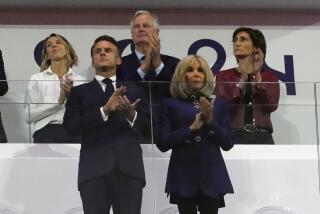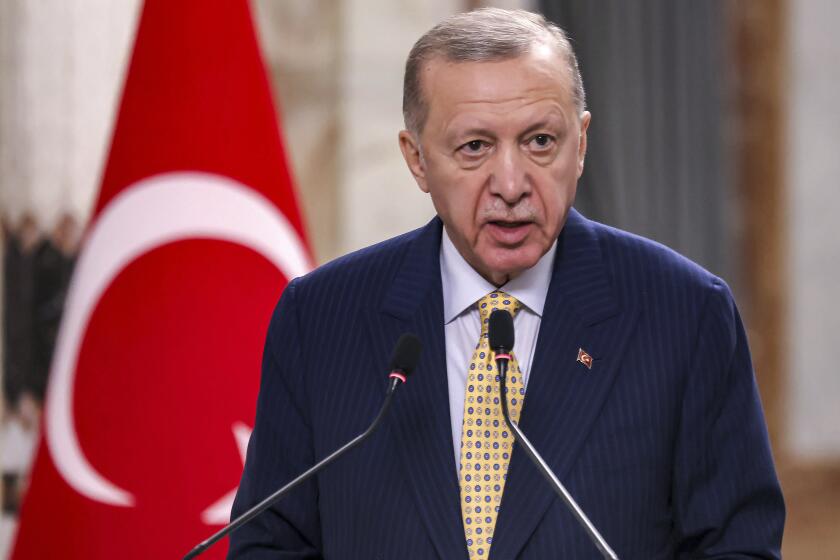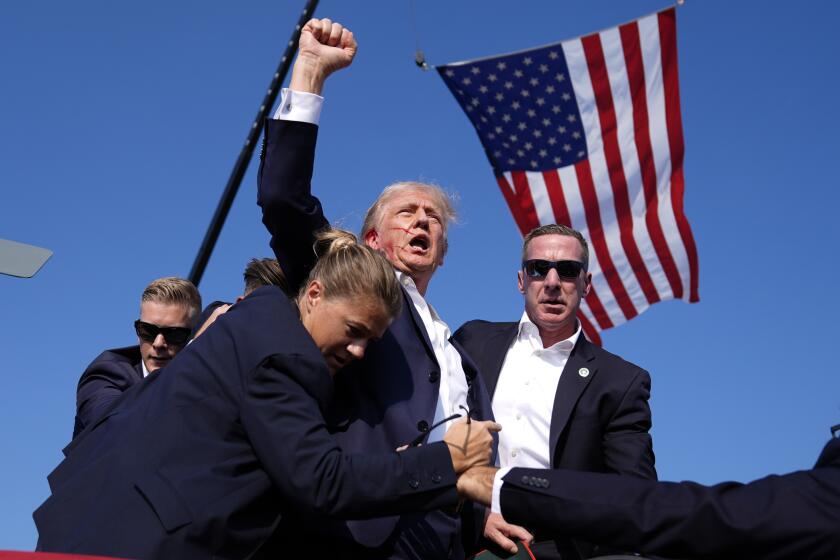Shades of Chavez in Ecuador’s Front-Runner
An audacious South American politician has made an unflattering comparison between President Bush and the devil, threatened to nationalize oil production and expressed his commitment to popular revolution. And it’s not Hugo Chavez.
The rhetoric of Rafael Correa, the favorite in today’s presidential election here, could pass for that of Chavez, the Venezuelan leader. Correa, a 43-year-old U.S.-educated economist, has struck a stridently anti-U.S. tone in a campaign in which he has come from nowhere in the polls three months ago to assume a commanding lead.
Although a runoff election on Nov. 26 is likely, Correa is seen by analysts as the odds-on favorite to become Ecuador’s next president.
The strongest among his 12 competitors, banana magnate Alvaro Noboa and former Vice President Leon Roldos, are both 5 percentage points or more behind him.
Correa’s rise in the polls has stirred apprehension among those who fear he would join Chavez, Bolivia’s Evo Morales and Argentina’s Nestor Kirchner in a coterie of U.S.-bashing Latin American leaders. Wall Street has also taken notice: The country’s sovereign bonds have lost 10% in value over the last month after Correa threatened to default on Ecuador’s $14 billion in foreign debt.
Correa has held public office only once, a controversial three-month stint as finance minister in 2005. But he has surged in the polls with an anti-establishment, anti-U.S. campaign that has resonated with youth, women and the middle class, pollster Hugo Barber said.
In a Sept. 27 television interview, when asked about Chavez’s description of Bush as the devil in his address to the U.N. General Assembly last month, Correa responded: “The devil is evil, but intelligent. I believe Bush is a tremendously dimwitted president who has done great damage to his country and to the world.”
To avoid a runoff, the leading vote-getter must win an absolute majority, or 40% with a 10 percentage-point margin of victory. Most pollsters expect Correa to get about 30% of the vote today.
He has tapped into voter disenchantment with Ecuador’s political system that manifested itself in April 2005, when protesters forced the resignation of President Lucio Gutierrez, chanting: “Throw them all out!”
Correa has made no secret of his admiration for Chavez, but Chavez has not openly endorsed Correa, perhaps learning a lesson from his past public support of candidates in recent Mexican and Peruvian elections who ultimately lost.
There are no congressional candidates running under his banner who could push his legislative agenda. Rather, Correa is proposing a constitutional assembly immediately after he takes office through which he says he would “reinvent Ecuador,” smashing corruption and party malfeasance.
Correa’s reformist bent and his promises to do away with a political system that many see as weak and corrupt are, along with his winning stump persona, the keys to his appeal.
“People who like him want political reform,” said Barber, whose Quito-based firm is called Datanalisis.
But some analysts such as Alexandra Vela of the Profitas consulting firm here are worried that Correa would use such an assembly to rewrite Ecuador’s Constitution to make himself more powerful, much as Chavez did immediately after taking office in February 1999.
An opponent of a free-trade agreement with the United States, Correa says the key to economic growth is state investment in national companies to supply the goods that Ecuadoreans need. Many such businesses would be cooperatives in which workers own stakes -- a cornerstone of Chavez’s agenda.
In an interview Friday, economist and Correa confidant Alberto Acosta said a Correa government would “restructure” any foreign debt that it considered illegal or illegitimate, without offering a definition of illegality. Acosta has been tapped as Correa’s energy minister, should he take office.
“We are friends of Chavistas, but not Chavistas. We are Bolivarians,” Acosta said, referring to the legacy of 19th century revolutionary Simon Bolivar.
The Bolivarian revolution is the broad rubric under which Chavez is transforming the Venezuelan economy.
A university professor who got his doctorate in economics from the University of Illinois, Correa said he favored regional Latin American trade agreements over free trade with the United States. At the end of this year, Ecuador and three other Andean nations are losing trade preferences given to them by the U.S. in 1991 as incentives to farmers to not grow coca, poppies or marijuana. Each country has sought to replace them with free-trade agreements.
Some economists, including Maria de la Paz Vela of the Multiplica consulting firm, say the loss of free trade will inflict a death blow on export-oriented flower and fishing industries, while making Ecuador vulnerable to contraband goods from neighbors Colombia and Peru. Nearly half of all Ecuadorean exports now go to the United States, she said.
Correa has also promised not to renew the deal expiring in 2009 by which Ecuador leases space at its Manta military base to the United States to launch anti-narcotics overflights. The U.S. has up to 300 military and nonuniformed personnel based at Manta, as well as eight AWACS and other aircraft.
*
Times special correspondent Paul Rosero contributed to this report.
More to Read
Sign up for Essential California
The most important California stories and recommendations in your inbox every morning.
You may occasionally receive promotional content from the Los Angeles Times.








